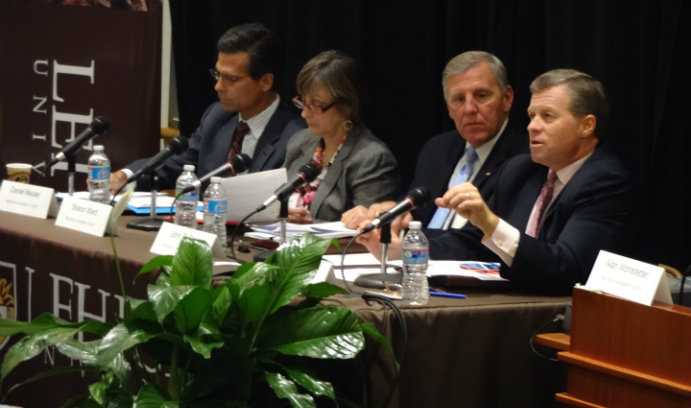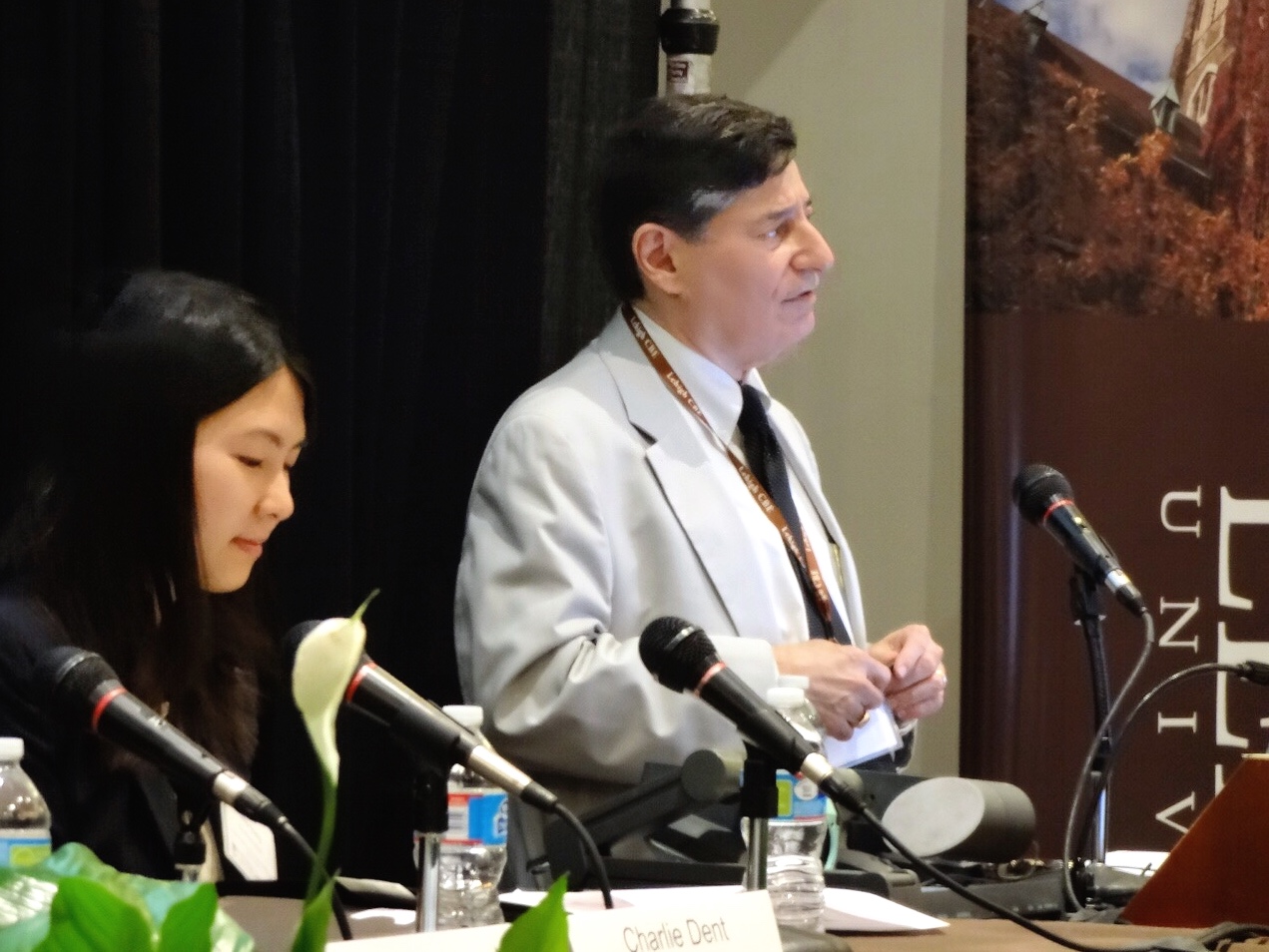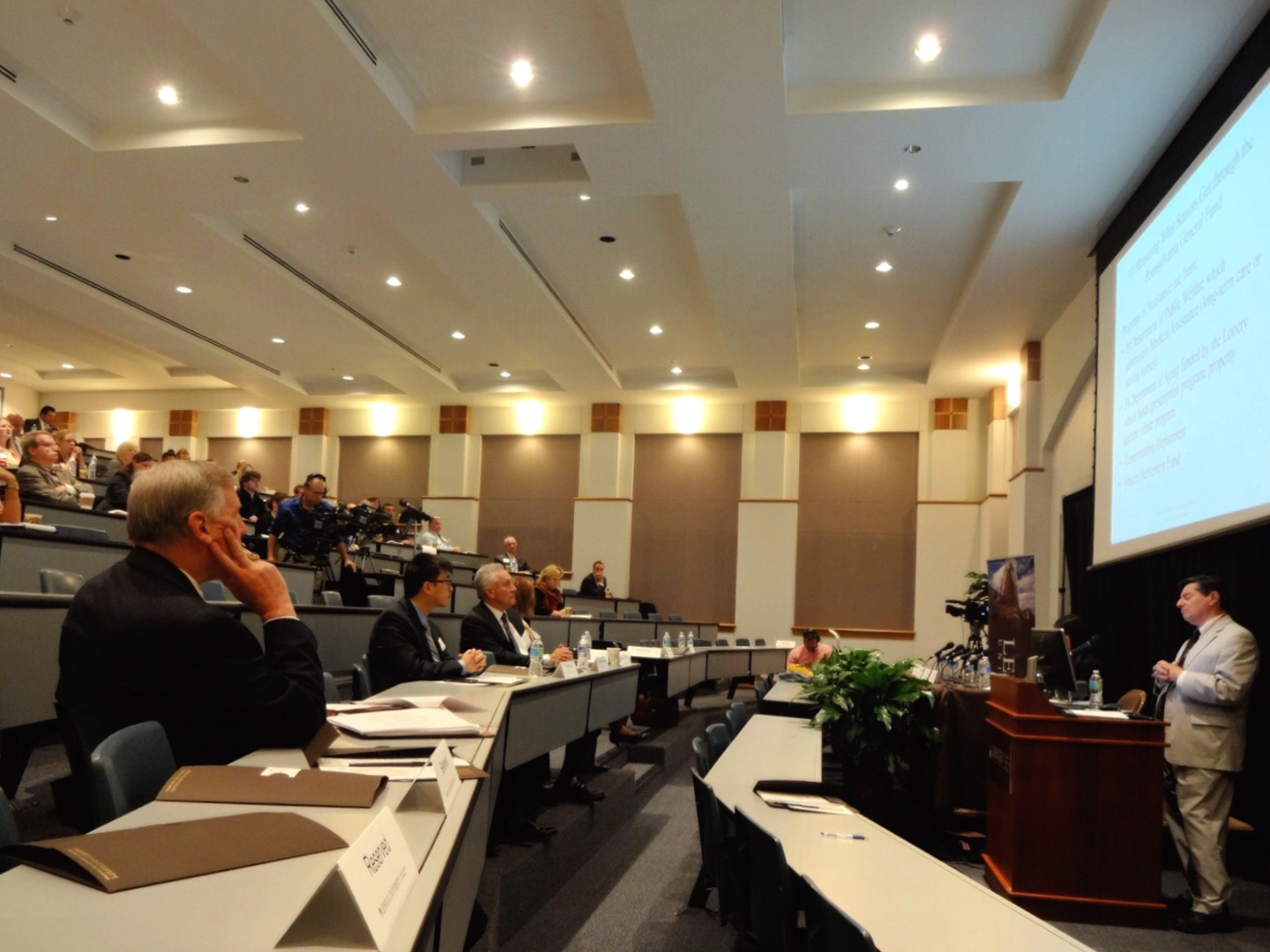Symposium assesses state’s fiscal challenges

From left, Pennsylvania Revenue Secretary Daniel Meuser; Sharon Ward, executive director of Pennsylvania Budget & Policy Center; state Sen. John P. Blake, minority chair, Senate Finance Committee; and U.S. Rep. Charlie Dent, R-Lehigh Valley at Lehigh's symposium on fiscal challenges facing Pennsylvania.
Economists, lawmakers and community leaders converged on Lehigh today for a symposium on the fiscal challenges facing Pennsylvania as its population ages, its health care costs rise and the gap between state revenue and spending potentially widens.
Robert Strauss, professor of economics at Carnegie Mellon University, addressed the fiscal implications of Pennsylvania’s aging population. He posed the prospect of taxing retirement income as a way to pay for the services that those 65 years of age and older will increasingly need.
“I think we’re overly generous to our seniors,” said Strauss, the opening speaker at the daylong symposium organized by Lehigh’s College of Business and Economics. He was joined by research analyst Yunni Deng, of the International Monetary Fund.
Strauss said Pennsylvania currently spends about $4 billion a year on seniors, a figure he expects will jump to between $5.8 and $7 billion a year by 2025. By not taxing retirement income, he said, the state forgoes about $2.4 billion a year in revenue.
“Spending is fun. Taxing is hard,” he acknowledged.
The symposium, titled “The Crisis in State and Local Government Finance,” brought together a host of government and community leaders to discuss current state and local funding issues. Among the speakers and panelists in the morning sessions were U.S. Rep. Charlie Dent; Pennsylvania Revenue Secretary Daniel Meuser; state Sen. John P. Blake, minority chair of the state Senate Finance Committee; and Sharon Ward, executive director of the Pennsylvania Budget and Policy Center.
“This symposium represents the ethos of Lehigh University—the theoretical paired with the practical in a cross-disciplinary exploration of the problems of the day,” said Georgette Chapman Phillips, the Kevin L. and Lisa A. Clayton Dean of the College of Business and Economics, in welcoming guests.
Phillips said the timing of the fiscal discussions was auspicious, given that Pennsylvania Gov. Tom Corbett had signed a bill Thursday that allows Philadelphia to impose a cigarette tax to fund public schools. The state’s fiscal health also figures into the upcoming gubernatorial election.
“These are complicated issues,” Phillips said, “and we hope that this type of forum facilitates a better understand as we strive to make informed decisions.”
Many of those who attended the forum live-tweeted using the hashtag #LehighTalksLocalGov.
In regard to the issue of taxing retirement income, Strauss said Pennsylvania has the third highest percentage of residents who are age 65 and older. He said he expects the percentage of older Pennsylvanians to grow in the next decade or so, with a million more seniors in the state, and the percentage of working-age residents to decrease. He asked where Pennsylvania would get the money to fund services for seniors.
“You’ve got a political problem,” he said.
Strauss pointed out that Pennsylvania is one of just three states that does not tax private retirement income and one of six without a tax on public retirement income.
The morning panel discussion that followed Strauss’ talk was lively, with panelists raising issues that included burgeoning pension costs and reform, job creation, the privatization of state liquor stores and the debate over whether to tax natural gas extracted from Marcellus Shale in Pennsylvania.
Dent said that a shale tax, if imposed, should be used to offset income tax. “There ought to be some broad benefit to all Pennsylvanians,” he said.
Revenue Secretary Meuser pointed to the millions of dollars in impact fees that are already being generated by the drilling. In response to whether there are worries beyond the cost of the state’s aging population, he said state leaders need to make Pennsylvania attractive to not only retirees but also to young people in search of a vibrant place to live and work.
The symposium also featured an afternoon panel discussion with Holona Ochs, assistant professor of political science, and Craig Hochbein, assistant professor of educational leadership; and another panel discussion among local government, business and school leaders.
Also in the afternoon, Robert Inman, professor of economics at the University of Pennsylvania, presented “City Taxes and City Growth. He pointed out that Philadelphians are the most heavily taxed residents in the region. According to live tweets from the presentation, Inman said a better fiscal balance could result from regional cooperation and smart spending.
The final panel discussion focused on fiscal issues facing municipalities in the Lehigh Valley. Panelists included Bethlehem Mayor Robert Donchez, Bethlehem Area School District Superintendent Joseph Roy, Allentown City Council President Julio Guridy, and Don Cunningham, chief executive officer of the Lehigh Valley Economic Development Corporation.
According to live tweets, Guridy credited the Neighborhood Improvement Zone, created in 2009, for breathing economic life back into downtown Allentown and for reversing the trend of businesses leaving the city. Cunningham said the Lehigh Valley had a balanced approach to public investment. To pay for schools and city services, he said, governments would need to raise money by expanding their economic bases.
Photos by Christa Neu
Story by Mary Ellen Alu
Posted on:



